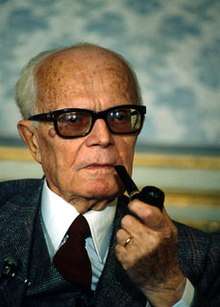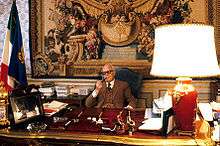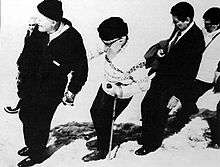Sandro Pertini
Alessandro "Sandro" Pertini, OMCA (Italian: [(ales)ˈsandro perˈtiːni]; 25 September 1896 – 24 February 1990)[2] was an Italian journalist, partisan and socialist politician who served as the seventh President of Italy, from 1978 to 1985.
Alessandro Pertini OMCA | |||||||||||||||||||||||||||||||||
|---|---|---|---|---|---|---|---|---|---|---|---|---|---|---|---|---|---|---|---|---|---|---|---|---|---|---|---|---|---|---|---|---|---|
 | |||||||||||||||||||||||||||||||||
| 7th President of Italy | |||||||||||||||||||||||||||||||||
| In office 9 July 1978 – 29 June 1985 | |||||||||||||||||||||||||||||||||
| Prime Minister | Giulio Andreotti Francesco Cossiga Arnaldo Forlani Giovanni Spadolini Amintore Fanfani Bettino Craxi | ||||||||||||||||||||||||||||||||
| Preceded by | Giovanni Leone | ||||||||||||||||||||||||||||||||
| Succeeded by | Francesco Cossiga | ||||||||||||||||||||||||||||||||
| President of the Chamber of Deputies | |||||||||||||||||||||||||||||||||
| In office 5 July 1968 – 4 June 1976 | |||||||||||||||||||||||||||||||||
| Preceded by | Brunetto Bucciarelli-Ducci | ||||||||||||||||||||||||||||||||
| Succeeded by | Pietro Ingrao | ||||||||||||||||||||||||||||||||
| |||||||||||||||||||||||||||||||||
| Personal details | |||||||||||||||||||||||||||||||||
| Born | 25 September 1896 Stella, Liguria, Kingdom of Italy | ||||||||||||||||||||||||||||||||
| Died | 24 February 1990 (aged 93) Rome, Lazio, Italy | ||||||||||||||||||||||||||||||||
| Nationality | Italian | ||||||||||||||||||||||||||||||||
| Political party | PSU (1924–1930) PSI (1930–1990) | ||||||||||||||||||||||||||||||||
| Spouse(s) | Carla Voltolina | ||||||||||||||||||||||||||||||||
| Alma mater | University of Genoa | ||||||||||||||||||||||||||||||||
| Signature | |||||||||||||||||||||||||||||||||
| Website | Sandro Pertini Foundation | ||||||||||||||||||||||||||||||||
Early life
Born in Stella (Province of Savona) as the son of a wealthy landowner, Alberto, he studied at a Salesian college in Varazze, and completed his schooling at the "Chiabrera" lyceum (high school) in Savona.
His philosophy teacher was Adelchi Baratono, a reformist socialist who contributed to his approach to socialism and probably introduced him to the inner circles of the Ligurian labour movements. Pertini obtained a Law degree from the University of Genoa.
Aged 19 when Italy entered World War I on the side of the Triple Entente, Pertini opposed the war, but nonetheless enlisted in the army where he served as a lieutenant and was decorated for bravery. After the armistice in 1918, he joined the Unitary Socialist Party, PSU, then he settled in Florence where he also graduated in political science with a thesis entitled La Cooperazione ("Cooperation"; 1924). While in the city, Pertini also came into contact with people such as Gaetano Salvemini, the brothers Carlo and Nello Rosselli, and Ernesto Rossi. Pertini was physically beaten by Fascist squads on several occasions, but never lost faith in his ideals.
Resistance to Fascism
After the assassination of PSU leader Giacomo Matteotti by Fascists in the 1924, Pertini became even more committed to the struggle against the totalitarian regime. In 1926, he was sentenced to internment, but managed to go into hiding. Later, together with Carlo Rosselli and Ferruccio Parri, he organized and accompanied the escape to France of Filippo Turati, who was the most prominent figure of the PSU. Pertini remained in the country until 1926 working as a mason. On his return to Italy, he was arrested in Pisa and sentenced to ten years' imprisonment.
In 1935 he was interned on Santo Stefano Island, Ventotene (LT), Pontine Islands, an island in the Tyrrhenian Sea, where he remained through Italy's entry into World War II and until 1943. There he saved the famous diaries of Antonio Gramsci. Although he had begun suffering from severe illness, Pertini never demanded pardon. He was released a month after Benito Mussolini's arrest, and joined the Italian resistance movement against the Nazi German occupiers and Mussolini's new regime – the Italian Social Republic. Arrested by the Germans, he was sentenced to death but freed by a partisan raid. Pertini then travelled north to organize partisan war as an executive member of PSI (alongside Rodolfo Morandi and Lelio Basso). He had a primary role in the Milan uprising of April 25, 1945, which led to the execution of Mussolini.
Prominence

After the war ended in Italy on 25 April 1945 and the monarchy was abolished through the 1946 Italian constitutional referendum, Pertini was elected to the Constituent Assembly (La Costituente), the body that prepared the new republican Italian Constitution. In the postwar era he was a prominent member of the directive board of the Italian Socialist Party (the PSI, which the PSU had rejoined).
In spite of his intransigent attitude toward the Italian Communist Party, Pertini was suspicious of many policies enforced by the PSI. He criticized all forms of colonialism, as well as corruption in the Italian state and within the socialist party, where he kept an independent political position.
He was elected president of the Italian Chamber of Deputies in 1968,[3] and in 1978, the 81-year-old Pertini was elected President of the Italian Republic, the highest office in the nation. Despite his advanced age, he displayed considerable energy and vigor, playing a major role in helping restore the public's faith in the government and institutions of Italy, as well as maintaining an active schedule of traveling and meeting foreign dignitaries. During the Brigate Rosse terrorism period of the Anni di piombo, Pertini openly denounced the violence. He also opposed organized crime in Italy, South African apartheid, Chilean dictator Augusto Pinochet and other dictatorial regimes, as well as the Soviet invasion of Afghanistan. In 1985, he stepped down from the presidency, becoming automatically senator for life. The only official role he accepted in his retirement was President of the "Filippo Turati" Foundation for Historical Studies of Florence inaugurated in 1985 and dedicated to recording and preserving the history of the socialist movement in Italy. In December 1988 Pertini was the first person to be awarded with the Otto Hahn Peace Medal in Gold by the United Nations Association of Germany (Deutsche Gesellschaft für die Vereinten Nationen, DGVN) in Berlin, "for outstanding services to peace and international understanding, especially for his political ethics and practical humanity." Pertini died in February 1990 at the age of 93 and was mourned across the nation.
1982 World Cup Final
Pertini attended the 1982 World Cup Final in Madrid for a match between Italy and West Germany just two days after the fourth anniversary of his inauguration. After Italy scored their third goal, he wagged his finger to either the German delegation or King Juan Carlos I, and probably said "they [the German team] will not catch us any more".[4] Paolo Rossi, Italy's and the tournament's top scorer, later said: "I remember that when he welcomed us at the Presidential Palace after our win, he rose and said: 'This is my best day as President.'" [5]
Relationship with Pope John Paul II

Sandro Pertini had a close friendship with Pope John Paul II, with whom he met often both for official and private occasions, and had frequent phone conversations. In "Accanto a Giovanni Paolo II", he is known to have referred to his mother looking over him in heaven, moved that her atheist son was friends with the Pope.
On 13 May 1981 he went to the Gemelli Hospital as soon as he heard that the Pope had been shot, and stayed until late in the night when he was told that the Pope was not in danger anymore. He recalled the event later that year in the annual New Year's Eve Presidential Address to the Italian People.[6]
Honours and awards
In 1986 he received the Freedom medal.
In popular culture
- In the 1975 film Last Days of Mussolini, by Carlo Lizzani, it is a character inspired to Pertini, performed by Sergio Graziani.[7]
- In early 1980s Andrea Pazienza created the comic book series Il Partigiano Pert ("The Partisan Pert(ini)"), a comedy strip portraying Pertini during World War II with the same cartoonist as his helper.[8][9][10]
- Pertini has been mentioned in some verses of several Italian songs, as in Sotto la pioggia ("under the rain", 1982) by Antonello Venditti, Babbo Rock ("Daddy Rock", 1982) by the Skiantos, L'Italiano ("The Italian", 1983) by Toto Cutugno, Caro Presidente ("Dear President", 1984) by Daniele Shook, Pertini Dance (1984) by the S.C.O.R.T.A., Pertini Is A Genius, Mirinzini Is Not Famous (2007) by the Ex-Otago.[11][12]
Electoral history
| Election | House | Constituency | Party | Votes | Result | |
|---|---|---|---|---|---|---|
| 1946 | Constituent Assembly | Genova–Imperia–La Spezia–Savona | PSIUP | 27,870 | ||
| 1953 | Chamber of Deputies | Genova–Imperia–La Spezia–Savona | PSI | 22,802 | ||
| 1958 | Chamber of Deputies | Genova–Imperia–La Spezia–Savona | PSI | 19,966 | ||
| 1963 | Chamber of Deputies | Genova–Imperia–La Spezia–Savona | PSI | 22,579 | ||
| 1968 | Chamber of Deputies | Genova–Imperia–La Spezia–Savona | PSI | 24,235 | ||
| 1972 | Chamber of Deputies | Genova–Imperia–La Spezia–Savona | PSI | 53,657 | ||
| 1976 | Chamber of Deputies | Genova–Imperia–La Spezia–Savona | PSI | 35,506 | ||
References
- As a member of the Constituent Assembly he was automatically nominated senator.
- Profile of Alessandro Pertini
- With the ardor of those who drove merchants from the temple, Speaker Pertini ordered to drive away the "whips" from the aisle, accelerating the outcome of the presidential election in 1971 : Buonomo, Giampiero (2015). "Il rugby e l'immortalità del nome". L'Ago e Il Filo. – via Questia (subscription required)
- Video on Pertini exulting at the Italian team's victory on YouTube
- Article on emagazine.credit-suisse.com Archived 19 January 2013 at Archive.today
- "Presidential Address of New Year's Eve 1981". The official website of the Presidency of the Italian Republic.
- (in Italian) "Lizzani: Pertini wrote to me that Audisio didn't shoot the Duce" (La Provincia)
- (in Italian) "Il Partigiano Pert" (lastoriasiamonoi.rai.it)
- (in Italian) "Pertini, the partisan president in the amazing comics of Andrea Pazienza" (slumberland.it)
- (in Italian) "Pertini" on andreapazienza.it Archived 4 February 2017 at the Wayback Machine
- (in Italian) "The 5 best songs dedicated to Sandro Pertini" (orrorea33giri.com)
- (in Italian) "Sandro Pertini, our president ever, historical figure and man" (quotidianpost.it)
External links
| Wikimedia Commons has media related to Sandro Pertini. |
| Preceded by President of Vietnam Ton Duc Thang |
The oldest current head of state March 30, 1980 – June 29, 1985 |
Succeeded by President of Malawi Hastings Banda |
| Political offices | ||
|---|---|---|
| Preceded by Brunetto Bucciarelli-Ducci |
President of the Chamber of Deputies 1968–1976 |
Succeeded by Pietro Ingrao |
| Preceded by Giovanni Leone |
President of Italy 1978–1985 |
Succeeded by Francesco Cossiga |
| Party political offices | ||
| Preceded by Pietro Nenni |
Secretary of the Italian Socialist Party 1945 |
Succeeded by Ivan Matteo Lombardo |